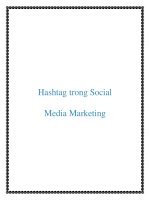SOCIAL MEDIA ADVERTISING FOR B2B
Bạn đang xem bản rút gọn của tài liệu. Xem và tải ngay bản đầy đủ của tài liệu tại đây (1.31 MB, 7 trang )
SOCIAL MEDIA
ADVERTISING
FOR B2B
SOCIAL MEDIA
ADVERTISING
FOR B2B
Driving Sales through Advertising
on Facebook and LinkedIn
Driving Sales through Advertising
on Facebook and LinkedIn
866.497.5505 | www.bizo.com | Follow us on Twitter: @bizo
If you’re trying to find your prospects online,
social networks are prime spots to look:
Americans between the ages of 18 and 64 spend an average of 3.2 hours every
day browsing Facebook and other social networking sites.
1
And lest you think business executives have more important things to do with their
time, you’re in for a surprise: The same study found that senior decision-makers
spent 40 percent more time browsing social networks than those in lower-level
positions. B2B marketers are already taking social media seriously on content
development. Given sophisticated targeting capabilities, a natural next step for any
B2B marketer is to tackle paid media.
Social media advertising is an ideal platform for reaching your B2B business
prospects, but many marketers are struggling to reach the right people with the
right messaging.
In this guide, we’ll help you learn how to target your ideal B2B customers across
the social networks they frequent—and how to convert them into sales.
1
Ask the right questions about your
campaign—before you start.
Prior to launching your campaign, it’s important to clearly define your goals:
What do you hope to achieve? Do you want to gain more followers for your
Facebook page, generate more leads on a conversion form on your website, or
raise brand awareness?
Social advertising is an ideal way to educate and engage prospects as they progress
along the buyer’s journey. Create social ads that lead your prospects to your
website with the goal of downloading highly relevant, targeted white papers and
other content offers, which they must fill out a conversion form to view. You can use
this gated educational content to educate them about your prospect and industry,
and to further nurture the leads through your own email marketing program.
1 Ipsos Open Thinking Exchange (OTX).
2
Define the audiences that are most likely
to convert—and find them.
A wide cross-section of Americans visit social networks frequently. In order to
reach an audience of truly qualified leads, you’ll need to take a highly targeted
approach. Focus on reaching the end decision-maker, as well as any job functions
that may have influence in choosing business solutions.
In targeting prospects, consider these criteria:
•
Current/intended customers (company types, specific company names)
•
Target job titles (including variations such as “VP” and “vice-president”
•
Target industries
•
Location: Regional, national, global
LinkedIn is a business-focused social network that clearly defines each user’s
industry and job title, so it is simple to target users according to job function and
seniority, although many users don’t list information such as age and gender.
You can also target users according to discussion groups they belong to, such as
“Digital Media” or “IT Professionals.” Because different benefits of your business
solution may appeal to different job functions, consider creating separate
campaigns for each target job function. Creating and optimizing your campaigns
effectively can be a complex process—when possible, tap into the expertise of
Social advertising is ideal for nurturing and educating leads through the buying process.
TOP FUNNEL IMPACT
TOP FUNNEL IMPACT
(Brand Awareness)
MID FUNNEL IMPACT
MID FUNNEL IMPACT
(Content Engagement & Education)
BOTTOM FUNNEL IMPACT
BOTTOM FUNNEL IMPACT
(Lead Generation & Sales Conversions)
MID FUNNEL IMPACT
MID FUNNEL IMPACT
(Content Engagement & Education)
Targeting
Targeting
your advertising technology providers who can help you build more sophisticated
targeted campaigns on LinkedIn to reach the right prospects and increase
conversion rates.
Facebook offers B2B marketers tremendous opportunities to reach their precise
business audiences through the Facebook Exchange (FBX), a real-time bidding
system in which marketers can leverage third-party data to reach their target
audiences when they are on Facebook, and retarget them with highly relevant
ads. By partnering with advertising platforms that enable access to third-party
data on business professionals, Facebook Exchange gives marketers the ability
to specifically target users according to job function, industry, and other business
demographics data that are not available through its own advertising platform.
3
Develop and test your ad creative.
When advertising on social media, you’re subject to limitations with your ad
creative that you don’t face with traditional display: There is extremely limited real
estate, with small graphics and limited text space. However, social ads do have one
significant benefit: Because each ad is not custom-designed, it is much easier to
change the text or switch out an image to optimize your conversion rates based
on performance.
Even slight differences in your ad creative can have a big impact on conversion
rates. Develop six to ten distinct variations of each targeted ad for your
Consider creating separate campaigns for specific job titles
to increase relevancy and conversions.
campaign, paying close attention to your choice of graphics and the wording in
your calls-to-action.
Although image sizes are small, they can have a big impact. Use bright colors,
such as red, to attract prospects’ attention, and select action-oriented pictures.
Ad copy should be compelling, to-the-point, and focus on solving a problem for
the prospect. Consider using a question for your tagline. The ad copy should be
targeted to the specific type of prospect—for instance, if you are targeting a CFO,
focus on how your solution can save the company money. Finish the ad with a call-
to-action, such as “get a free trial,” or “download a free e-book.”
Test multiple images and copy for each campaign to determine which selections
are most effective with each target group. When testing your creative,
conversions, rather than click-through rates, should be your primary focus.
Develop a multi-channel attribution system that allows you to carefully track how
many times each prospect was touched before converting—often, even prospects
who do not initially convert after viewing an ad will later visit a company’s website
or download a content offer.
Done effectively, social advertising can drive significant results: In Bizo’s own case
study, the company experienced 43% brand lift and a 77% lift in site traffic from
its target audience by incorporating LinkedIn and Facebook Targeted Advertising
tactics in the context of its larger display and branding.
4
Optimize your ad campaigns in real time and don’t
be afraid to turn o under-performing campaigns.
In order to make the most of your marketing budget, it’s important to track
your results across campaigns in real time, so that you can easily allocate more
funds to your highest-converting campaigns, and shut down campaigns that are
underperforming.
While space is limited with social advertising, targeting specific seniority levels and
job titles can yield tremendous results.
By using an advertising solution with a dashboard that allows you to track each of
your campaigns on a day-to-day basis, you’ll be able to instantly notice trends and
invest in your highest-performing ad variants to increase conversion rates, and
pause or turn off under-performing campaigns so you can focus on developing
new creative to replace these variants.
5
Set a competitive bid price.
It’s important to remember that, in social advertising, you will be competing with
many other companies for the opportunity to show your ad to highly qualified
prospects. In order to get your ads in front of the right people, set a competitive
bid price, whether you are using a Cost Per Click (CPC) or Cost Per Impression
(CPM) basis. Typically, marketers choose a Cost Per Click (CPC) basis so that they
are paying only for actual leads generated.
To determine your price, it’s advisable to bid a higher amount than the
recommended bids listed on your social marketing platform. Remember, you
will only pay one penny more than the next-highest bid, so bid aggressively—as
much as $2 more than the recommended maximum bid—if you want to deliver
impressions efficiently.
In the spirit of ongoing optimization, don’t be afraid to turn off under-performing campaigns.
6
Focus on the right metrics.
Your metrics will be a natural extension of your campaign goals and objectives.
To gauge the impact of your social campaigns, make sure you move beyond
measuring only impressions and clicks, and measure and optimize to the number
of actions generated by each campaign.
In some cases, a particular campaign may have a low click-through rate, but a high
conversion rate; such campaigns are worth continued monitoring even if the CTR
is lower than average. IRemember, focus not just on reaching a large number of
people, but on reaching the people that matter most to your business.
If you’re not achieving the conversion metrics you want, re-evaluate your overall
marketing approach, calls-to-action, and market segmentation to ensure that you
are approaching the right people with the right messaging.
Learn how we can help you with your social advertising at:
/>When it comes to determining the ROI of your social advertising campaigns, actions
(or conversions) speak louder than clicks.
©2013 Bizo, Inc. | 866.497.5505 | www.bizo.com | Follow us on Twitter: @bizo









